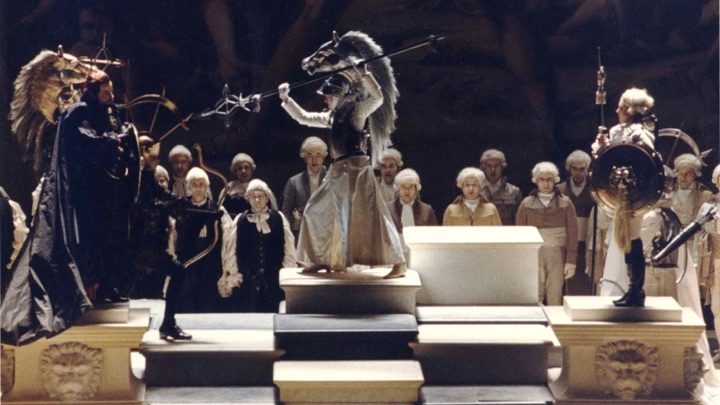
My first acquaintance with Rolandi was likely during City Opera’s otherwise uninspiring 1980 La Cenerentola telecast in which the soprano’s zany rendition of Clorinda’s aria di sorbetto (composed by Luca Agolini, not Rossini) stopped the show!
Her final City Opera telecast became a particular favorite: Rolandi portrayed the sprightly and moving title creature of The Cunning Little Vixen in the inspired Frank Corsaro/Maurice Sendak production.Her prominence at City Opera was not echoed at the Met where she began as Judith Blegen’s cover in Der Rosenkavalier; at her Sophie debut, Rolandi enticed Agnes Baltsa away from another similarly underused City Opera veteran, Johanna Meier. Her final Met role was Zerbinetta which she sang during Jessye Norman’s initial run at the house of Ariadne auf Naxos. I came to New York to hear one (and Margaret Price in Otello) but I got Gwendolyn Bradley and Brenda Boozer instead of Rolandi and Maria Ewing.
Later in 1985 though I got my only opportunity to hear Rolandi and her near-exact contemporary Ashley Putnam (born just six days apart!) in a concert performance at Carnegie Hall of Handel’s Alessandro. If the evening didn’t quite evoke the legendary rivalry of their roles’s creators Francesca Cuzzoni and Faustina Bordoni, the two sopranos delivered hundreds, maybe thousands of sixteenth notes with sporty brio! Each deserved better than their dull love object, Alexander the Not-so-Great. Rolandi and Putnam had also partnered the year before at the Glyndebourne Festival as Zdenka and Arabella in a production released first on VHS then on DVD.
In addition to Cleopatra and Lisaura in Alessandro, Rolandi sang lots of Handel including Ginevra in Ariodante, Rinaldo’s Almirena and the title role of Alcina. She debuted in Orlando at Lyric Opera of Chicago, where she would later become director of its Ryan Opera Center alongside her husband Sir Andrew Davis, Lyric’s long-time music director. I’m including as an appendix to the complete Orazi Rolandi in the shepherdess Dorinda’s three delightful arias from a Chicago Orlando performance.
Cimarosa composed more than 80 operas but he’s remembered for just one: the delicious comedy Il Matrimonio Segreto. But there were many serious works of which Orazi was one of his most popular. The first Curiazio was the soprano castrato Girolamo Crescentini, one of his genus’s last superstars. He also created Romeo in Zingarelli’s Giulietta e Romeo which Trove Thursday featured several years ago.
Like the Zingarelli, Cimarosa’s Curiazi pairs its soprano hero with a mezzo heroine. The creator of both Giulietta and Orazia was Giuseppina Grassini, ultimately better known for being the mistress of both Napoleon and the Duke of Wellington than for her onstage charisma. She also performed Orazia in Marcos Antonio Portugal’s setting of Orazi and would often interpolate Portugal’s arias for her character into her performances of the Cimarosa; Antonacci follows that tradition in today’s “pirate.” Grassini’s biggest impact may have been as the teacher of divas Giuditta Pasta and Giulia and Giuditta Grisi!
Cimarosa and Portugal hardly had the only word on the warring Horatii and Curiatii. A decade before Cimarosa’s opera, Corneille’s play Horace was adapted for Antonio Salieri’s Les Horaces; it has been recently recorded by the always-intrepid Christophe Rousset.
In 1846 Saverio Mercadante composed his own Gli Orazi e I Curiazi which Opera Rara has issued with the indefatigable Nelly Miricioiu as Orazia.
Bertolt Brecht too got into the act with Die Horatier und die Kuriatier, one of his Lehrstück, written in the early 1930s but not performed until after his death.
The story of the rival families proved so well known that there’s even a silly 1977 Italian film parody Orazi e Curiazi 3-2!
Cimarosa: Gli Oriazi e i CuriaziRome Opera
2 February 1989
In-house recording
Orazia — Anna Caterina Antonacci
Curiazio — Gianna Rolandi
Sabina — Patrizia Dordi
Licinio — Yoko Hadama
Marco Orazio — Franco Farina
Publio Orazio — Edoardo Guarnera
Augure — Danilo Serraiocco
Conductor — Alan Curtis
Handel: Orlando—exc.
Lyric Opera of Chicago
24 October 1986
In-house recording
Dorinda – Gianna Rolandi
Conductor – Charles Mackerras
Orazi as well as the Orlando arias can be downloaded by clicking on the icon of a square with an arrow pointing downward on the audio player above and the resulting mp3 files will appear in your download directory.
For comic Cimarosa, check out a fizzy performance (in German!) of Il Marito Disperato here.
In addition, nearly 400 other podcast tracks are always available from Apple Podcasts for free, or via any RSS reader. The archive which lists every Trove Thursday offering since the beginning in alphabetical order by composer was updated in September.



